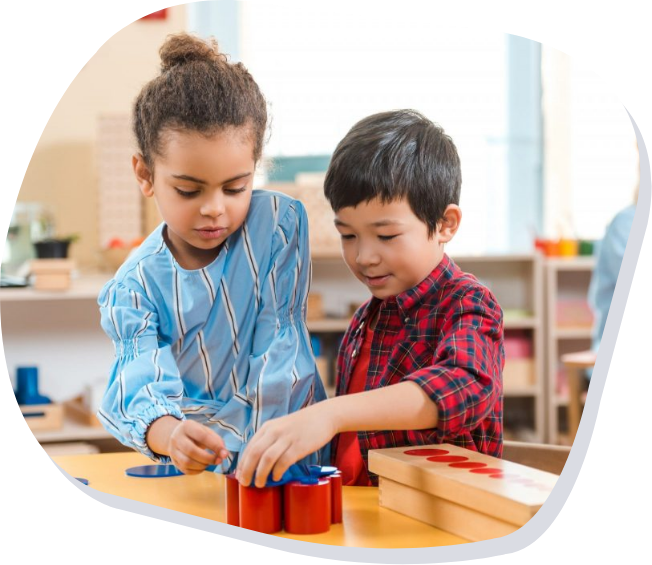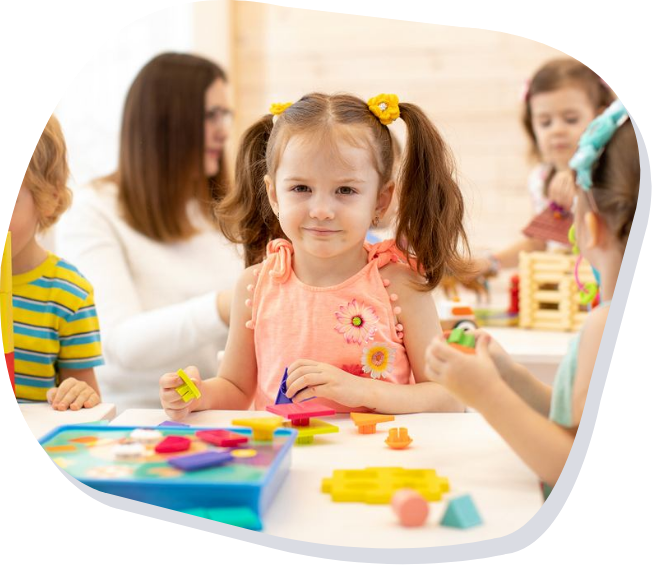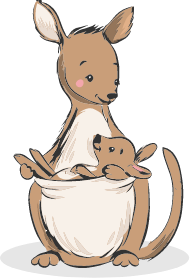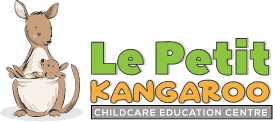Junior Preschool
Our Junior Preschool Program seeks to stimulate the child’s curiosity and encourage well-rounded growth for all children based on their individual levels of development. Children get the chance to be involved in a variety of activities that foster their love of learning and discovery.
Some elements of the program are more structured and primarily evolve around the choice of the child, which offers an excellent introduction to self-guided learning. Through group and individual project work, the children will expand their skills in mathematics, science, social skills, music, visual arts, drama and language.

The classroom is set-up with specifically designed materials, taking important aspects of a child’s development into account, so as to help them benefit more fully from “periods of sensitivity”. The classroom has five sections: Practical Life, Sensorial, Language, Mathematical and Cultural. The program also incorporates creative arts, movement and singing.
Practical Life: The Skills of Daily Living
- In the classroom, there are four distinct groups of Practical Life exercises:
- Care of Person (buttoning, zipping, combing)
- Care of Environment (cleaning, sweeping, gardening, ironing, polishing)
- Development of Social Relations (greeting, serving, accepting, apologizing, saying please and thank you)
- Movement (balancing, walking on the line, playing the silence game)


Sensorial: Exploring the World
Mathematics: From Concrete to the Abstract
Preschool aged children have naturally mathematical minds. They have the capacity to reason, to calculate, and to estimate. They are intensely conscious of quantity, counting pebbles on the beach or cookies for dessert. The concrete mathematical materials allow these sensorial explorers to begin their mathematical journey from the concrete to the abstract through manipulation, experimentation, and invention.

The mathematical materials build on each other in increasing complexity so that a child using them will experience the thrill of discovery for themselves as part of a natural progression.

Language: From Spoken to Written
The Montessori preschool classroom emphasizes spoken language as the foundation for all linguistic expression. Throughout the entire Montessori environment, the child hears and uses precise vocabulary for all the activities, learning the names of textures, geometric shapes, composers, plants, mathematical operations, and so on. In addition, certain materials in the language area are particularly supportive of spoken language.
Culture: Allows the Child to Explore the Natural World Around Them and Includes:
- Geography (continents, landforms, earth layers, solar system)
- Zoology (classification, physiology of animals)
- Botany (ecology, classification, physiology of plants)
- History (timelines, using a calendar)
- Science
The cultural area is divided into geography, history, nature and science. There are many geography materials in the classroom to teach a child their place in the world. History assists a child in learning about the concept of change. By looking at the seasons, studying the weather and changing the calendar daily, a child learns to establish a cycle of time.


Art and Music: Integrated into the Prepared Environment
Various media, such as crayons, chalk, pencils, paint, clay, textiles, and variety of papers are available as are opportunities for singing, dancing and playing instruments.
Art and music are also explored culturally as they connect to historical periods and geographical places.
Art and music are also explored sensorially through prints hung at childrens height and music listening activities. Even the physical arrangement of the prepared environment is designed with an eye to colour, proportion, and overall beauty.
Enroll Now
Enrolling your child at our daycare centre depends on availability. Please call to check for space or register for the waiting list.

